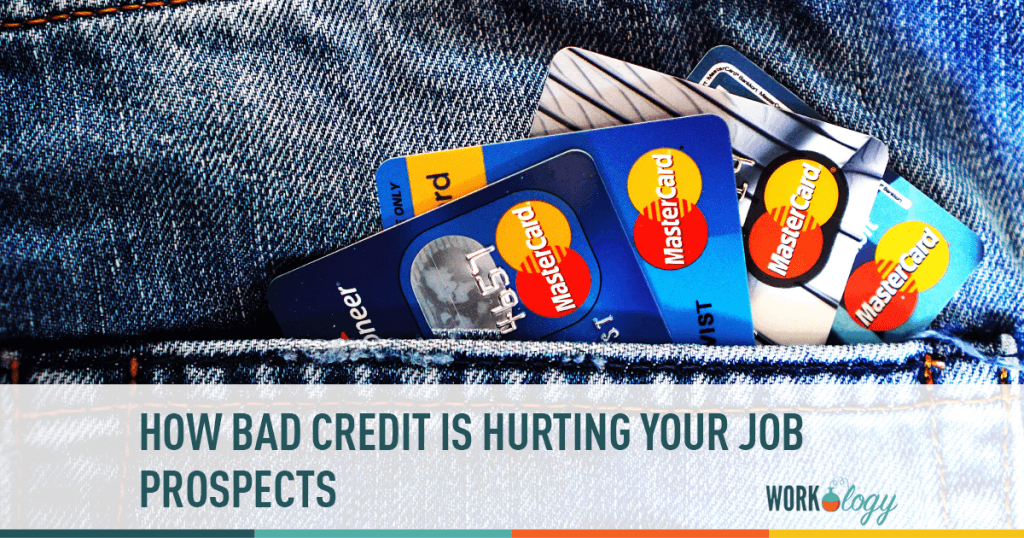You apply for a clerical job and score an interview, which leads to a second interview. Things are really looking good.
But suddenly, you’re turned down for the job. It turns out that the employer ran a pre-employment credit check and learned that your townhouse is in foreclosure and you’ve run up a lot of credit card debt lately. You’ve also paid some bills late.
Pre-Employment Credit Checks Are Hurting Your Job Search
Wait — you’ve just been rejected for an entry-level job because you paid some bills late and your home is in foreclosure? Yes. What the prospective employer might not realize, however, is that you’ve been living on an incredibly tight budget since you were laid off in January, and you’ve had to rely on credit cards more often. Some bills were paid late as you scrambled to assemble the payments.
This job market isn’t taking down only the job seekers with sketchy credit and purchasing decisions; it’s taking down those who, until very recently, had pretty good, if not great, credit. Keeping your credit report in good shape is getting harder too. Something as simple as making a large purchase on a store credit card can damage your credit and turn potential employers off.
A typical credit check allows companies to gain access to information about an applicant’s debt load, late payments, liens and other financial glitches. The only thing employers won’t know is the applicant’s overall credit score. Employers say an applicant’s credit history gives them a sense of the person’s judgment, and it’s important for higher-level positions where the employee will be handling large amounts of money. Fair enough. The last thing a company wants is an investor lawsuit claiming negligent hiring procedures because it didn’t conduct a pre-employment credit check.
But does having one’s house foreclosed upon necessarily mean the applicant is unqualified for a secretarial position when otherwise she has all the necessary job skills? Does paying a few bills late mean someone is unfit for a construction job? These gray areas are where pre-employment credit checks get murky. With so many unemployed people, so many foreclosures and so much debt, credit checks are becoming the nail in the coffin for entry-level job seekers who have faced growing financial pressure over the last 12 to 18 months.
I’ve been blogging about this topic for awhile now, and I’m glad to see The Los Angeles Times and The New York Times picked up on the story last week. The New York Times story cites a Society for Human Resources Management story that found 40% of employers ran credit checks on job applicants, but the study was from 2004.
With many economists saying the unemployment rate won’t spike until the middle of next year, more trouble lies ahead. More job losses. More home foreclosures. More purchases put on credit cards. More bills paid late. More pre-employment credit checks.
How to Handle Bad Credit When Looking for Work
So what’s a job seeker to do? First, know your rights. When a company turns you down for a job based on your credit report — something called an adverse action — it’s required by law to let you know, to give you the name of the credit reporting agency it used (Equifax, Experian or TransUnion) and to tell you how to receive a copy. A copy of your credit report is free as long as you request a copy within 60 days. Be aware that the credit reporting agency is legally obligated to correct any errors or incomplete information in your credit report.
Second, check your credit score periodically. It’s easy to do, and it’ll give you an idea of what potential employers might see. If there’s an unattractive credit glitch in your report, be ready to address it with potential employers. Let them how you’re addressing it, and why it shouldn’t impact your ability to do the job. Honesty is the best policy.
Third, keep an eye on state law. Some states are tightening restrictions on employer credit checks. Washington State’s applicant credit check law requires credit checks to be closely related to the job. Michigan and Ohio, meanwhile, are considering whether or not to ban employers from using credit histories when hiring. The law might be on your side, depending on where you live.
Finally, what if the credit information that led an employer to reject you is accurate? Unfortunately, you don’t have much recourse right now. If a company runs pre-employment credit checks, it should say so on the application. You can decide whether or not to apply.
It’s anyone’s guess how employers will reconsider what a good credit history looks like in the wake of this economic tsunami. In the meantime, you should understand how your credit history could affect your job search. Your next job could be riding on it.
Guest blogger Chris Penttila is a management columnist for Entrepreneur.com. She covers workplace issues on her, blog, Workplace Diva.










Comments are closed.